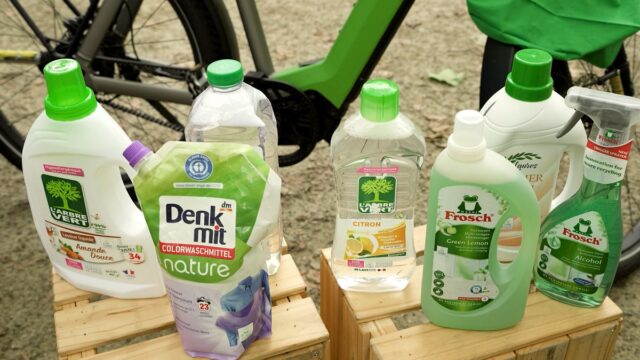A new directive significantly tightens EU rules on environmental advertising to prevent ‘greenwashing’. In future, companies will only be able to use certified sustainability labels and will need to be able to provide evidence of specific environmental claims.
They are everywhere in stores: small ecological formulas, or environmental labels… Brands tout their green credentials. But where is the line between ecological and greenwashing?
The rules will change throughout Europe from 2026. A new directive aims to better protect consumers against ‘greenwashing’. Some formulas, like ‘Eco-Friendly‘, could disappear from the labels.
“On its own it means nothing, it is a good example of a generic allegation. These vague allegations will be prohibited. So you can’t just say ‘eco’, or just ‘green’, or something like that, but you have to be more specific. Why exactly do you claim that your product is organic or green? If you really want to be that general, You have to be able to demonstrate why the entire product is greener and not just one aspect of it“says Miriam Thiemann, responsible for Sustainable Consumption Policy at the European Consumer Organization (BEUC)
The EU wants to go further. The objective is that ecological claims are justified and systematically verified. This is the subject of another directive that is still being debated.
“The central idea is that a trader, before using an ecological declaration or label, You must gather all the evidence that shows that what you say is true. And, in addition, an independent verifier will have to verify that the tests are adequate and sufficient to meet all the requirements of the directive,” adds Miriam.
Miriam takes as a model the european eco label, created more than 30 years ago by the Commission. We visited the showroom that tours Europe to promote products.
“We have shoes, polo shirts, textiles, detergents and paint. You can also make paint with the EU eco-label at home, which will be better for you and better for your children at home,” explains Cédric Hananel, CEO of Arctik. .
According to Thiemann, “all companies that apply for the EU eco-label submit all documentation to a independent verifier which proves that they really do what the ecological label requires.”
The EU eco-label It is granted to almost 100,000 products and services in the EU. We travel to Flanders to visit a company that has been awarded the label: HeadBelgian leader in domestic cleaning, which employs 15,000 people.
We attended a training session. For greater security, the company has chosen to certify its own cleaning products. For Judith Witters, head of ESG and Diversity at Glowi, those labels are becoming more and more importantespecially with the regulations and policies that are coming.
“People use too much water in their homes and also too many chemicals. That’s why we said we wanted to change the situation, because what they use is too dangerous. The impact on our business is, first of all, less people sick, more people working, of course, happy customers and, of course, a growing business,” says Elly Huysmans, co-founder and co-CEO of Glowi.
In the fight against ‘greenwashing’the EU can have relays throughout the continent. And some are determined not to let any misleading claims slide. In the Netherlands, the ACM is the supervisory body.
The Dutch Authority for Consumers and Markets (ACM) has made sustainability a key priority. For example, has taken action against several energy and airline giants. In particular, against those who allude to the alleged carbon neutrality of its products and services.
“When something polluting is done for the climate and the environment, the pollution has already occurred. Therefore, it cannot be undone. We see that we can influence. We can help consumers become better informed and better able to consume sustainably. We can also protect well-intentioned companies,” explains Edwin van Houten, director of the ACM Consumer Department.
This year, the ACM warned Booking.com on the eve of the new European regulations. Since then, the hallmarks of ‘sustainable travel‘ have been replaced on the web by a new sustainability program based on third-party certification. We visited the headquarters of the European travel booking giant to find out more.
“We take very seriously thinking about how we can make sustainable options easier for travelers. Third-party certifications are an expert body that creates a set of standards for accommodations on what they need to be considered sustainable. And then they go and evaluate the properties to make sure they’re really making those efforts,” says Danielle D’Silva, Head of Sustainability, Booking.com.
“We work with several reputable third-party certifications. The EU Ecolabel is a good example of that. And so the traveler can see which properties have done these things and feel that they have confidence in that label. We have 16,000,000 properties that have a certification. There are many more establishments that do not have certification. So the big question is how we can help accommodations obtain certification.”
There are more and more holiday accommodations that obtain the ecological label. In the Netherlands there are several: in the famous Vondelpark in Amsterdam there is the famous youth hostel Stayokay.
“Certification is serious. It is not an ecological facelift. European regulations make it more transparent and you have to demonstrate what you do. There is a lot of administration involved, but it’s for a good cause. If not, ‘greenwashing’ will continue to exist,” says Stayokay CEO Marijke Schreiner.







